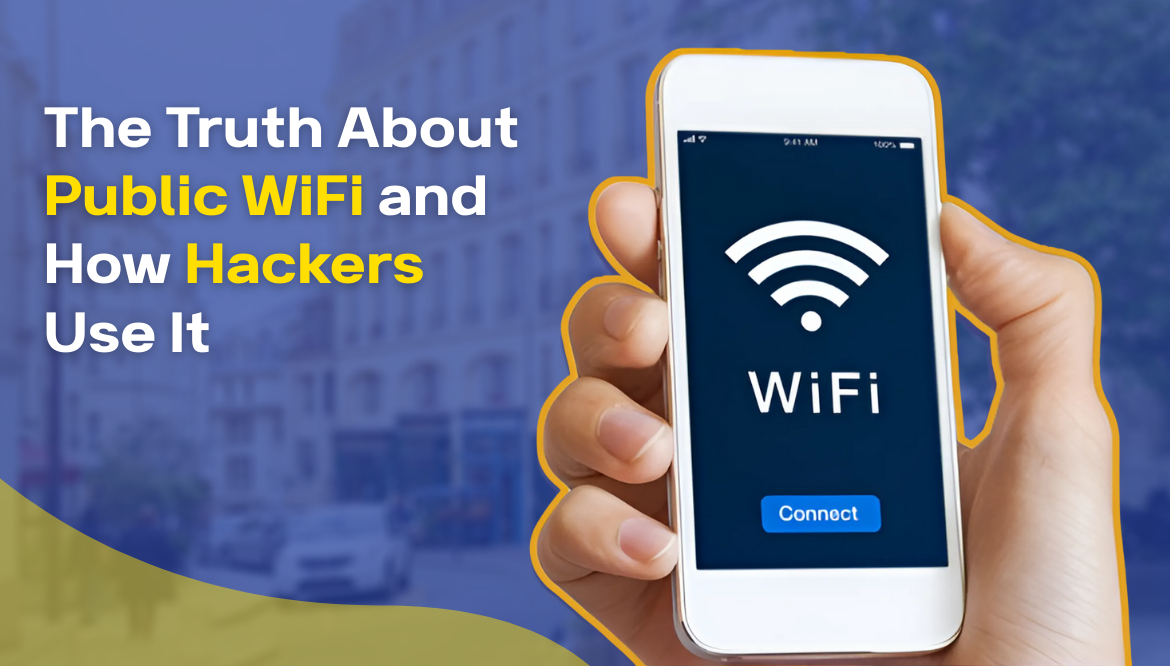Public WiFi networks are often linked to hacking attempts. When you use a public network, you’re putting your system at risk of being hacked. Working professionals face even higher risks because they often carry their laptops to hotels, restaurants, and cafes where public networks are available, and their devices may automatically connect.
Since these networks don’t require authentication, they seem convenient to use. However, they can allow infected files and malware to enter your system, potentially damaging your data. Many people don’t realize the dangers of public networks until something goes wrong.
This blog explains everything about using public networks - the risks involved and the prevention measures you can take. Read till the end to keep your device safe.
Why Public WiFi Is Risky?
Public WiFi is usually unsecured and doesn’t need any security authentication. It often tempts users into connecting without thinking about the risks. But these networks are the trap hackers create for such users, and then use them to get access to their bank accounts and other confidential information.
This means you may be directly sharing your information with hackers. As a consequence, they get your credit card information, email password, and bank account password, which they misuse for criminal activities.
Moreover, they might introduce malware or viruses via this unsecured wireless network. Malware may cause data theft, slow PC performance, financial loss, etc. After accessing your information, the hacker will use your identity for various purposes.
However, not every public WiFi network is set up by hackers. Many are safe to use, but precautions are still necessary. Hackers and scammers often target vulnerable systems. So, if you take precautions, they won’t be able to enter your system.
Precautions While Using Public WiFi
As you know, public WiFi can be dangerous; using some safety measures will save your data and money from threats and misuse. Let’s understand what those are:
Use a VPN (Virtual Private Network)
Using a VPN is crucial when connecting to public WiFi. This connection will secure your data and money from theft, and the hacker’s attempt will fail. This is because they have to put the stolen information through a time-consuming decryption process. And they look for an easy target, so your system will likely be protected.
Visit Secure Websites (HTTPS)
Using a VPN connection is not always possible. However, you can still protect your information by using websites with HTTPS (SSL certification). You can enable the HTTPS option for websites you visit frequently, especially those where you enter passwords.
Remember not to reuse passwords, as doing so can make it easier for hackers to access multiple accounts. Hackers know that people often use similar passwords for different accounts, and it becomes an opportunity for them to steal your information.
Avoid Sharing Sensitive Info
Don’t open your bank accounts or any other confidential information while connected to a public network. It can create a security risk, and hackers will use it to empty your account. Moreover, avoid accessing any other confidential information on your system.
Install Antivirus Software
Every user should install a powerful antivirus solution on their computer. It protects the system from unauthorized access, virus and malware attacks, and constantly scans the PC for any threats. Installing a reliable antivirus program will help keep your important data secure.
Sometimes, you have no choice but to use public WiFi while out. In this case, antivirus software protects your computer from any threatening vulnerabilities.
Conclusion
Accessing computers on public WiFi is a risky task. Some public WiFi networks may be exploited by hackers who wait for easy targets to steal sensitive information. Even experienced users can fall into this trap and lose data or money.
Fortunately, there are ways to protect a system from potential cyber attacks. For instance, using a VPN connection, avoiding accessing confidential information on public WiFi will keep everyone safe. Installing a suitable antivirus software on your computer will also be a mindful decision.
FAQs
What Happens if I Use a Public WiFi Network?
A public WiFi network is often unencrypted and may allow harmful files, such as viruses or malware, to enter your system, such as viruses and other malware, and steal your bank information, passwords of your important accounts, and other confidential information.
What if I Don’t Use a VPN on Public WiFi?
If you don’t use a VPN connection on a public network, your data and other information will be at high risk. Hackers will easily enter your system and corrupt it with malware and steal your sensitive data. But if you use a VPN connection, your system will be protected.
Is It Safe to Use Hotel WiFi?
Hotel WiFi is usually intended for guests, but sometimes it lacks proper security measures and can put your details at risk. So, whenever you browse anything, check emails, or shop, your information won’t be protected. So, it’s better to use your mobile data when ordering something or checking your email. In the case of computers, avoid clicking on any random message.

